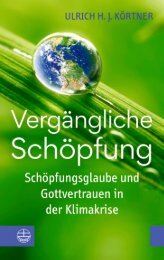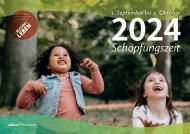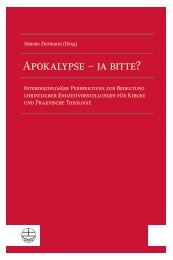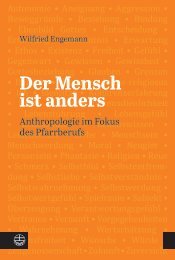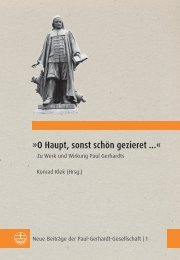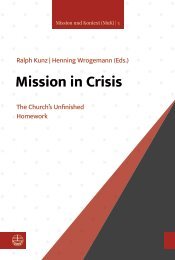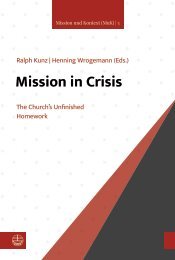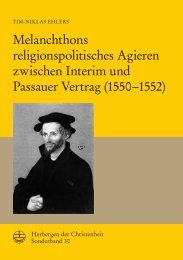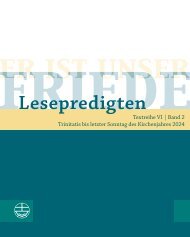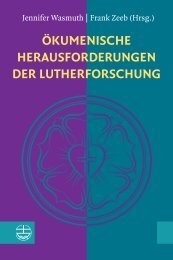Phillip A. Davis, Jr. | Daniel Lanzinger | Matthew Ryan Robinson (Eds.): What Does Theology Do, Actually? (Leseprobe)
Create successful ePaper yourself
Turn your PDF publications into a flip-book with our unique Google optimized e-Paper software.
<strong>Phillip</strong> Andrew <strong>Davis</strong>, <strong>Jr</strong>. (USA / Germany); <strong>Daniel</strong> <strong>Lanzinger</strong> (Germany);<br />
<strong>Matthew</strong> <strong>Ryan</strong> <strong>Robinson</strong> (USA / Germany)<br />
Introduction<br />
The WDTD Project<br />
Central to the purposes of the <strong>What</strong> <strong><strong>Do</strong>es</strong> <strong>Theology</strong> <strong>Do</strong>, <strong>Actually</strong>? (hereafter,<br />
WDTD) project is to observe, document, describe, and compare the functions of<br />
theological knowledge production and communication as that knowledge and<br />
those communications are experienced, cultivated, and used around the world<br />
today. Additionally, the project is interested in the ways the cultivation of theological<br />
practice is routinized and normativized by means of organizing and institutionalization,<br />
whether in theological faculties at universities, in confessional<br />
and ecumenical seminaries, in church offices and denominations, and also in<br />
forms of church-society transfer such as institutes and think tanks but no less<br />
NGOs or even protest movements. WDTD seeks not to do theology but to observe<br />
what theology does.<br />
In its Introduction, the first volume of WDTD situated the work of WDTD<br />
within a transcultural framework. The focus lay on the ‘‘flows’’ of theological<br />
language as this language is deployed from and for local places, by particular<br />
Christian churches and groups, but in their efforts to address themselves to locality-transcending,<br />
indeed, global challenges. And in this interaction of the local<br />
and the global, the question arises to what extent global discourses using the<br />
language of Christian theology influence the interpretation and self-understanding<br />
of Christian churches and groups in particular places, and to what extent<br />
particular interpretive appropriations of the language of Christian theology,<br />
in speaking to the world via addressing global challenges, influence contextoverarching<br />
usage and understandings of that very language. This focus remains<br />
central to the project overall. It is a driving interest of the project to look for any<br />
patterns or trends that might be identifiable in the use of Christian-theological<br />
language world-wide. How might such language be involved in the transcultural<br />
dynamic of particular communities and traditions negotiating the encounter with<br />
problems that they face in common? The questions are, what do Christian theologies<br />
do in helping conduct these negotiations, and what changes in Christian



